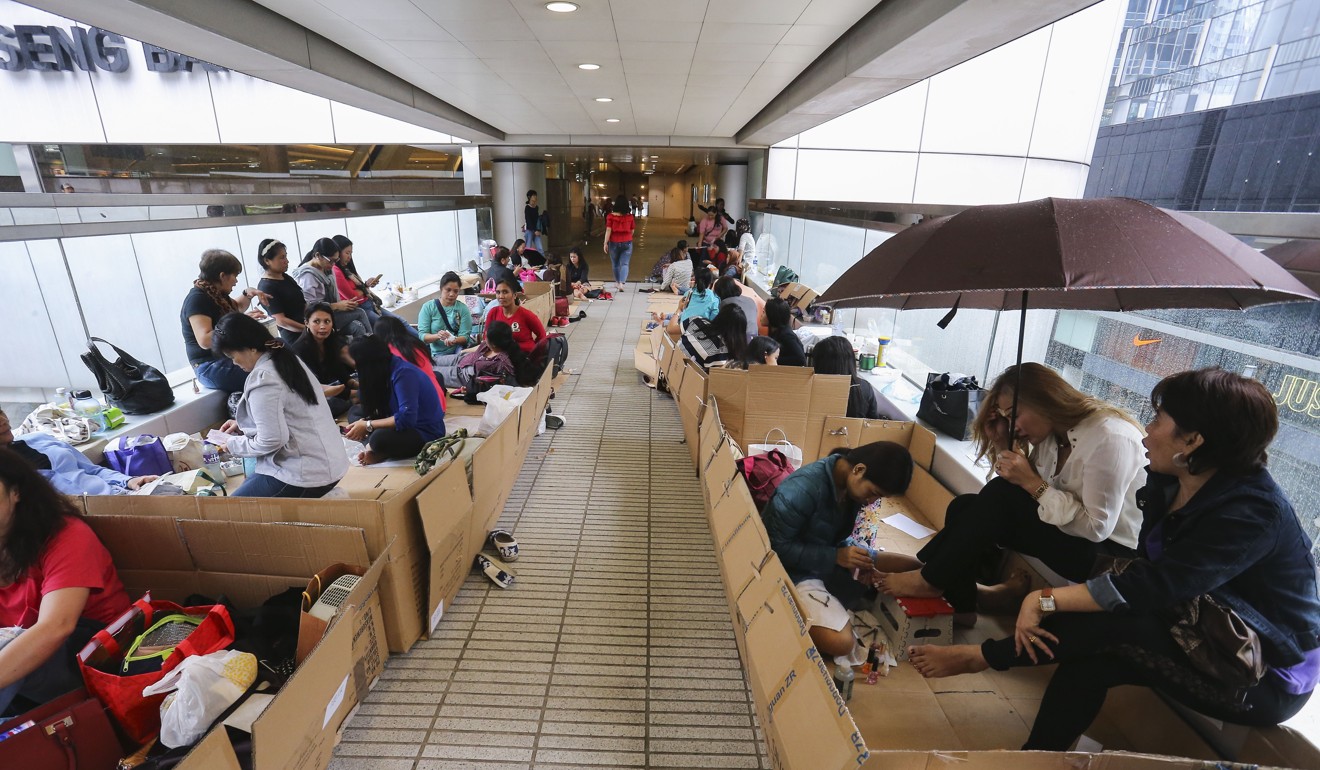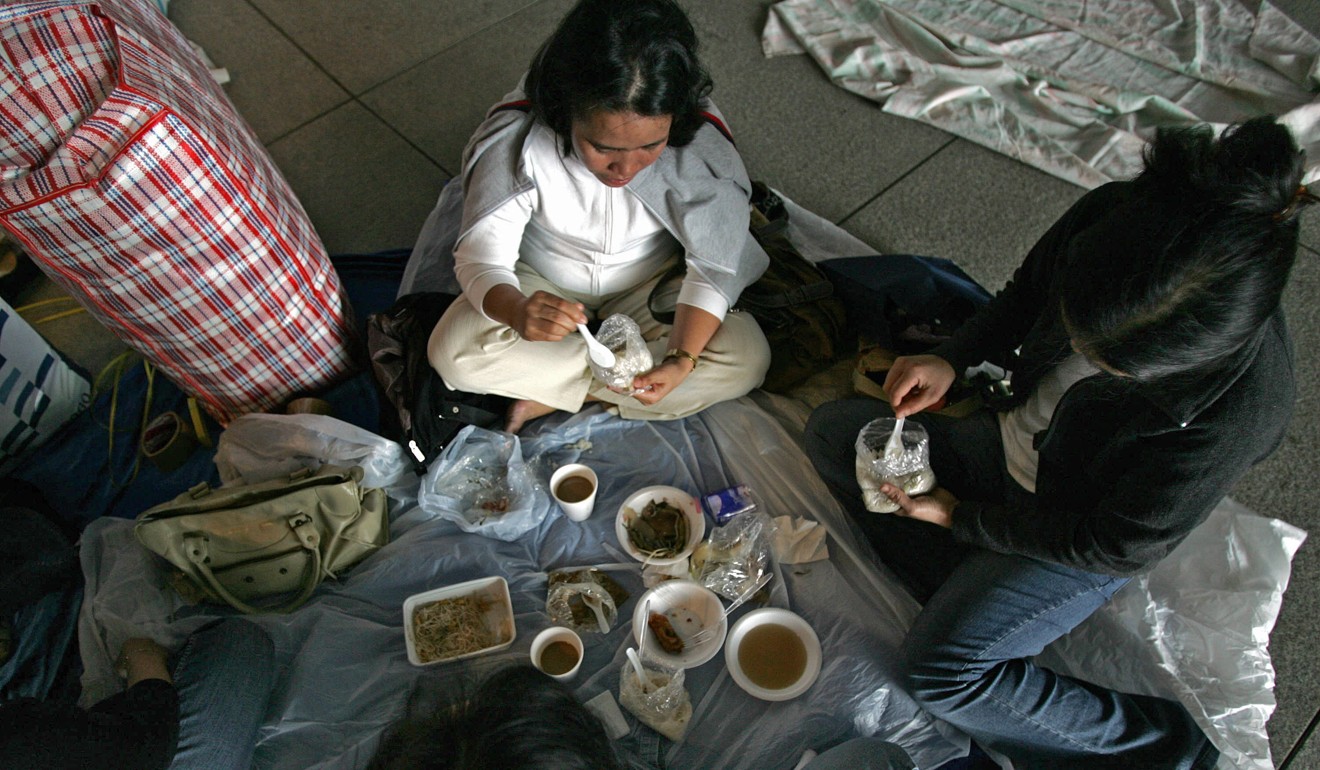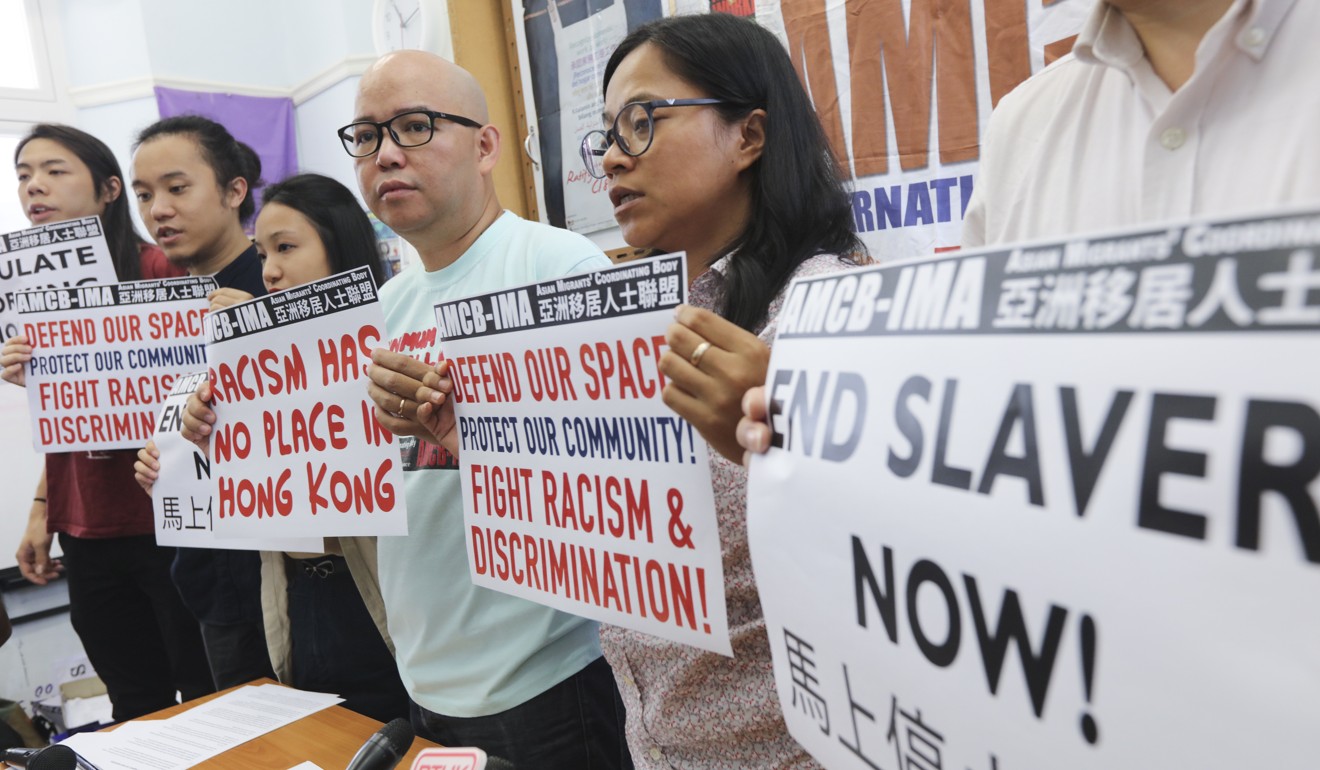
Hong Kong’s domestic helpers plan protest march over lawmaker’s ‘racist and discriminatory’ remarks
New People’s Party legislator Eunice Yung under fire for calling helpers who hang out in city parks an inconvenience affecting ‘environmental hygiene’, but party says she didn’t mean to offend anyone
Migrant groups will march in protest on Sunday over “racist and discriminatory remarks” Hong Kong lawmaker Eunice Yung Hoi-yan made about foreign domestic workers.
On Friday the groups demanded an apology from Yung, a barrister and New People’s Party legislator, who said at the Legislative Council that their presence around the city was inconvenient and affected the city’s “environmental hygiene”.
Many of the city’s 380,000 helpers typically gather in public spaces such as Victoria Park in Causeway Bay, under flyovers, and on footbridges on a Sunday to relax, sleep, pray and eat.

Yung’s party issued a statement on Friday evening, saying the lawmaker had not intended to offend anyone.
“[Yung’s] main concern is to find more venues for our foreign domestic helpers to gather on their holidays and to find a win-win solution for all,” the statement read.
“Eunice is sympathetic to their situation. Supporting their families by working abroad is never easy. She appreciates their contribution to Hong Kong’s development. It is against her wish to offend anyone.”
The party said Yung would “engage in constant dialogue with concern groups, to understand their needs”.
The statement continued: “The New People’s Party will continue our efforts in urging the government to step up its level of support by providing suitable venues for different ethnic groups in Hong Kong to foster cultural diversity, as well as to promote social integration.”
Top Philippine diplomat in Hong Kong Antonio Morales backs calls to raise minimum wage of city’s domestic helper
Officials from local labour groups, plus human rights and pan-democratic party representatives, added their voices to the outcry, accusing the New People’s Party of being anti-migrant and using helpers for its own political ends.
Eman Villanueva, a Filipino group leader and co-spokesman of the Asian Migrants’ Coordinating Body, said the march would leave from Chater Road in Central at 11am, and finish at the New People’s Party headquarters on Hennessy Road in Wan Chai.
“The main objective is to criticise and condemn the racist and discriminatory remarks made by Eunice Yung, and to call on the New People’s Party to stop using us as political capital for their own political objectives, stop their opportunistic ways to divide local and Hong Kong people,” he said.
Sringatin, an Indonesian workers’ leader and the group’s spokeswoman, pointed to comments made by New People’s Party chairwoman Regina Ip Lau Suk-yee, who in the past referred to foreign domestic workers as “homewreckers”.

At Legco on Wednesday, Secretary for Labour and Welfare Dr Law Chi-kwong said 1,858 verbal warnings for “obstruction of public places” were issued last year to foreign domestic helpers who used Leisure and Cultural Services Department facilities.
That compared with 1,604 in 2016 and 1,455 in 2015, although Sringatin said that according to government figures there were only 22 complaints received last year.
Law said the government departments “do not specially deploy personnel at foreign domestic helper gathering places”, and rejected Yung’s call to set up additional community centres “at this stage” for domestic workers to use on their day off.
No one wants to stay in public areas. The majority of us only have four to six hours of sleep, and one rest day
Only one such centre, the Bayanihan Kennedy Town Centre, which accommodates 1,800 people, has been available since 1994. It can cost as much as HK$3,000 to rent.
Yung, who represents New Territories East, also complained at Legco on Wednesday about helpers congregating in parks, and in other public places, such as under flyovers and on footbridges.
“They sit, eat and sleep on the ground, thus affecting the daily lives of the public, the operation of shops and the environmental hygiene in public places,” she said. “The problem has persisted for many years and shows a worsening trend.”
Sringatin said workers were being criticised, even though they had nowhere else to go to on their days off.
“No one wants to stay in public areas,” Sringatin said. “The majority of us only have four to six hours of sleep, and one day of rest. We are forced to stay in public areas, in rain and heat.”

Mung Siu-tat, chief executive of the Hong Kong Confederation of Trade Unions, said Yung’s speech was “discriminatory and misleading”.
He added: “We should never take foreign domestic workers as the source of social problems such as issues with the operation of businesses and public hygiene. The Hong Kong government should think about how to support domestic workers who live in Hong Kong in a better and more decent way.”
Domestic ‘worker’, not helper: how Hong Kong media can empower the migrant population
The government has in recent years come under fire for the treatment of domestic helpers. Groups have accused it of shifting responsibility for providing care services for residents, by importing cheap labour in “slave-like” conditions.
Foreign domestic workers have been forced to live with their employers since 2003.
Groups, including the Justice and Peace Commission of the Hong Kong Catholic Diocese and the Mission for Migrant Workers, have called on the government to lessen restrictions on domestic workers by giving them an option to live out, and to define what is acceptable accommodation in employment contracts.

